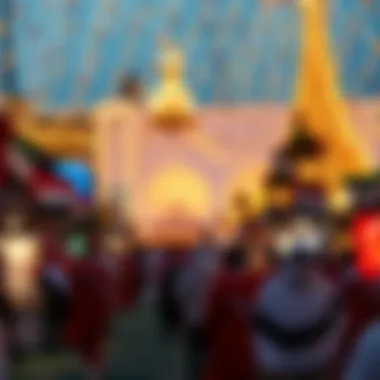National Days and Holidays in the UAE for 2023


Intro
The United Arab Emirates, a vibrant tapestry of cultures, celebrates various national days and holidays that reflect its unique heritage and evolving societal norms. Each yearly cycle brings with it a series of festivities that not only foster community spirit but also significantly influence the business landscape, particularly in the bustling real estate sector of Dubai.
As we delve into the national days and public holidays for 2023, it becomes vital to recognize not just the dates but the underlying significance of these occasions. Major holidays such as the UAE National Day and Eid al-Fitr serve as focal points for the community and activities that may impact market behaviors.
Understanding these key festivities can provide investors, buyers, agents, and designers with an advantage by predicting trends and navigating the complexities of the real estate landscape. In this article, we will explore the essence of each holiday, from their cultural meanings to their influences on market behaviors. We will also provide insights into current real estate prices, future market predictions, and a guide for buying and renting, particularly in Dubai.
By familiarizing ourselves with the rhythms of these national celebrations, stakeholders can better appreciate how social dynamics can affect real estate opportunities and challenges alike. Prepare to uncover how the confluence of culture and commerce shapes the UAE's real estate market during these pivotal moments in 2023.
Preamble
Understanding national days and public holidays in the United Arab Emirates is pivotal, not just for residents but also for investors and stakeholders in various sectors. The UAE boasts a rich tapestry of cultures and traditions, and these holidays provide a window into the nation's identity, values, and aspirations. They reflect the uniqueness of Emirati society and underscore the importance of family, community, and spirituality in daily life.
Importance of National Days
National days offer citizens and residents alike a chance to celebrate and reflect on their heritage. For investors, these occasions create vibrant atmospheres in cities like Dubai and Abu Dhabi, where public gatherings and festivals abound. During these days, it’s common to see buildings illuminated with colorful lights, and citizens proudly displaying flags. This public spirit can boost economic activities, from retail sales to tourism.
Moreover, national holidays serve as a reminder of the UAE's formation and growth. Events such as UAE National Day bring to the fore the moments of unity that helped shape the nation. Investors looking to tap into the local market must appreciate the emotional resonance these days hold for residents, as understanding cultural sentiments can lead to more informed and strategic decisions.
Overview of UAE Holidays
The UAE calendar for 2023 is dotted with numerous public holidays, each with its significance and celebration style. These holidays are more than mere days off; they represent a blend of traditional Islamic observances and unique national celebrations.
For instance, Islamic holidays such as Eid al-Fitr and Eid al-Adha emphasize values of charity and community bonding, while the UAE National Day celebrates the founding of the nation through parades and firework displays.
As these dates approach, businesses often adapt their marketing strategies, taking advantage of the heightened consumer interest. Understanding when these holidays fall and their cultural contexts can provide valuable insights into potential investment opportunities and seasonal market trends.
By analyzing the socio-economic impacts of these national observances, both domestic and foreign entities can position themselves more strategically within the evolving landscape of the UAE's dynamic economy.
Public Holidays in the UAE for
Public holidays hold a significant place in the cultural mosaic of the United Arab Emirates. They’re not just days off work, but moments that encourage celebrations, community gatherings, and a time for reflection on national identity. They foster an atmosphere of unity among residents and citizens alike.
New Year's Day
New Year’s Day in the UAE marks the beginning of the Gregorian calendar year on January 1st. It's a time when many people, whether newcomers or long-standing residents, express their hopes and aspirations for the upcoming year. It’s common for families to gather and share meals, while fireworks light up the night sky. The vibrant festivities serve as a reminder of renewal and fresh starts, making it essential for understanding the pulse of the Emirati community.
Eid al-Fitr
Significance of Eid al-Fitr
Eid al-Fitr, which translates to "Festival of Breaking the Fast," is one of the most awaited public holidays in the UAE. Celebrated at the end of Ramadan, its importance lies not just in the festive atmosphere but also in the spiritual cleansing it offers. Families come together to share meals, and charitable giving becomes a priority, underscoring communal care and responsibility. The holiday embodies both religious and cultural significance, drawing in various practices that resonate with diverse communities in the UAE.
Traditional Celebrations


During Eid al-Fitr, traditional celebrations can take on many forms, from attending special prayers at mosques to wearing new clothes—a tradition that symbolizes rebirth and gratitude. The practice of giving Zakat al-Fitr, a form of charity, highlights the communal bond shared among Emiratis. Many engage in large family feasts, showcasing a glorious array of dishes that reflect the multicultural backdrop of the nation. While these practices instill a sense of togetherness, they can also create challenges as local businesses witness a surge in demand for goods and services.
Impacts on the Real Estate Market
The Eid celebrations influence the real estate market significantly. With many expatriates returning home for the holidays, foot traffic in residential areas can fluctuate. Landlords may see alterations in rental demands, especially in family-oriented neighborhoods, as residents seek to maximize their holiday experience. Similarly, property developers might capitalize on the festive season to launch promotions or open house events, leveraging the emotional experience that Eid embodies. However, it’s crucial for real estate stakeholders to carefully consider the holiday's timing and its effects when making market predictions.
Arafat Day
Arafat Day is marked on the 9th day of Dhul Hijjah and is significant as it precedes Eid al-Adha. This day is meant for prayer and reflection, and many Muslims fast to commemorate the day. It holds special spiritual meaning, particularly for those who have made the pilgrimage to Mecca. It’s a stark reminder of faith and devotion.
Eid al-Adha
Eid al-Adha, also known as the "Festival of Sacrifice," is celebrated approximately two months after Eid al-Fitr and is tied to the pilgrimage period of Hajj. This holiday honors the willingness of Ibrahim to sacrifice his son in obedience to God's command. Families engage in acts of charity, and the ritual sacrifice of an animal symbolizes communal sharing and generosity.
Hijri New Year
The Islamic New Year, known as Hijri New Year, is a day for reflection and comprehension of the year that has passed. While not officially a public holiday, it’s celebrated in various ways, often marked by special prayers and the reading of the Quran. This day evokes a sense of introspection, which resonates with many in the UAE. Knowing how this day influences the mindset of the populace can benefit businesses and investors aiming to align their strategies with cultural sentiments.
Prophet Muhammad’s Birthday
The celebration of the Prophet Muhammad’s Birthday, or Mawlid, serves as an opportunity for Muslims to reflect on the teachings and the life of the Prophet. The day is marked with special prayers and gatherings that reinforce the core teachings of Islam, serving to strengthen communal bonds. Institutions may organize events for education and reflection, blending cultural significance into the very fabric of society in the UAE.
UAE National Day
Historical Context
UAE National Day is celebrated on December 2nd, commemorating the unification of the emirates in 1971. This day carries profound historical importance as it marks the birth of a nation. The observance includes parades, firework displays, and public festivities, showcasing national pride and identity. Recognizing this context is essential for understanding the deep-rooted patriotism that defines Emirati culture.
Cultural Significance
National Day is not merely a public holiday; it’s a heartfelt expression of unity among the different emirates and the multicultural population. The celebrations bring together cultures and backgrounds, emphasizing a shared national identity that defines the UAE. This significance permeates various aspects of daily life, from educational programs to corporate celebrations, which engage expatriates in the spirit of the day.
Celebration Methods
The methods of celebration vary but typically include cultural performances, fireworks, and street parties. Public spaces come alive with music and dance, illustrating the vibrancy of Emirati culture. Local businesses often join in, offering themed promotions and creating a lovely atmosphere for all to enjoy. However, logistical challenges can arise as crowds gather, and managing security becomes crucial, particularly in urban areas.
Commemoration Day
Commemoration Day is observed on November 30th and is dedicated to honoring the sacrifices of Emirati soldiers. It’s a solemn occasion that reminds the populace of the sacrifices made for the safety and security of the nation. The emphasis on remembrance and gratitude underlines the UAE’s values of honor and respect for those who have served. This day often sees less festivity compared to other holidays, as it is more about reflection than celebration.
Observance of Holidays Throughout the Year
The observance of holidays in the UAE is not just a calendar matter; it holds cultural, social, and economic significance that weaves into the very fabric of life here. With a diverse population bringing various traditions together, holidays serve as a mirror reflecting both the rich heritage of the Emirates and modern societal dynamics. Understanding these observances provides invaluable insight, especially for stakeholders in industries like real estate.
Cultural Reflections


Every holiday in the UAE celebrates something unique, resonating deeply with its people. For instance, Eid al-Fitr marks the end of Ramadan, a month of fasting and reflection. It embodies the spirit of giving and gratitude, strengthening family ties and community bonds. Traditional practices, such as preparing special dishes and giving to charity, are common during this time.
Similarly, the UAE National Day, celebrated on December 2, stands as a symbol of unity for the Emirates. It’s not just about festivities; it encompasses pride in national identity and shared history, emphasized through parades, fireworks, and cultural exhibits that engage all residents.
Factors contributing to the cultural significance of these holidays include:
- Community Engagement: Participation in local events increases overall social cohesion.
- Preservation of Heritage: Every celebration reinforces traditional practices, ensuring they evolve but do not disappear.
- Inclusivity: Even foreigners partake in the joy, often feeling gratified and included in local customs.
- Artistic Expression: Festivals provide a platform for artists to showcase traditional art forms and performances, enhancing cultural appreciation.
"Holidays are the threads that stitch together the fabric of our society, enveloping us in a shared emotional experience that transcends our diverse backgrounds."
Public Sentiment and Participation
The public sentiment surrounding holidays in the UAE can best be described as vibrant and inclusive. The buzz during these times is palpable, creating a sense of anticipation long before the actual celebrations unfold. Residents plan vacations, family gatherings, and community events well ahead, which reflects the keen interest and emotional investment in these observances.
From an economic standpoint, this collective enthusiasm translates into increased consumer spending, especially during holidays like Eid and National Day. Shopping malls and markets bustle with activity, promotions, and special sales that attract both locals and tourists. Factors influencing public sentiment include:
- Family and Friend Gatherings: Holidays often prompt reunions that strengthen social networks and relationships.
- Shared Experiences: Attending events and participating in festivities creates a sense of belonging among residents, whether they are Emirati or expatriate.
- Opportunities for Reflection: Many take time to reflect on personal and communal achievements during these significant days.
In essence, holidays in the UAE serve not just as time off from work, but as a wellspring for cultural exchange and social interaction, allowing the observation of both deep-rooted traditions and contemporary celebrations to coalesce harmoniously.
Impact on the Real Estate Sector
Understanding the impact of national days and holidays on the real estate sector in the UAE, particularly Dubai, is not just relevant—it's crucial. Investors, buyers, and real estate professionals must grasp how these holidays shape market behaviors and investment patterns. Each significant celebration brings unique opportunities and considerations that can influence real estate trends and consumer behavior.
During these festive periods, we often see a noticeable spike in market activity. This heightened interest comes from a blend of local and international investors eager to capitalize on holiday-specific promotions and incentives. Additionally, holidays often lead to an increase in foot traffic around properties for sale and rental units.
This bustling atmosphere presents an advantageous setting for stakeholders, allowing them to engage with potential clients in a more relaxed environment. Real estate firms can leverage this sentiment, tailoring their marketing strategies to resonate with a populace in a celebratory mood. Governing policies around public holidays can also influence when and how transactions are made, making awareness of these dates a necessity.
Market Trends During Holidays
Market trends clearly reflect fluctuations during holiday seasons, where certain categories of properties become hot commodities among buyers. For instance, in the lead-up to Eid al-Fitr and Eid al-Adha, residential properties tend to see increased demand. This is particularly true for larger homes or accommodations designed for family gatherings, as many families choose to celebrate these special occasions together.
The UAE National Day also sparks unique trend patterns. There is often a rise in interest for properties located in or near areas hosting celebratory activities, like parades and fireworks. This demand can drive prices up temporarily, making it notable for savvy investors who might want to position themselves accordingly.
Investment Opportunities
Holiday Promotions
Holiday promotions are a key element driving investments during national occasions. Real estate developers and agents frequently roll out attractive deals during these periods, incentivizing potential buyers. For example, discounts on property prices or waived registration fees tend to capture attention.
Such promotions are beneficial as they create urgency among buyers. The key characteristic of these holiday offers is their limited-time nature, compelling buyers to act swiftly. Furthermore, certain developments might offer exclusive amenities or fit-outs during these promotions, making them all the more appealing.
The unique feature of holiday promotions is that they often align with cultural celebrations, enhancing their relevance to potential buyers. However, while these discounts can allure many, there's also the risk of properties being overstated in value post-holiday, leading to buyer remorse later on. Thus, investors should remain vigilant, balancing the benefits against potential drawbacks.
Consumer Behavior Insights


Understanding consumer behavior during holidays is another vital avenue for real estate stakeholders. It's well-known that emotional triggers often enhance buying decisions around festive times. Families tend to prioritize home purchases as they prepare to celebrate with loved ones, making purchasing more about emotional readiness rather than purely financial incentives.
Key insights reveal that during holidays, buyers often gravitate towards properties with cultural significance or those located in vibrant community atmospheres.
This behavior can shift as some buyers adopt more impulsive strategies during festive periods. The unique feature here is the mix of sentimentality and practical consideration, where personal stories intertwine with financial transactions.
Though these insights can help frame marketing strategies effectively, real estate professionals should also remain aware of the fluctuations in preferences, ensuring they adapt their approaches to cater to both emotional and practical buyer needs.
Future Considerations for Stakeholders
Understanding the dynamics surrounding national days and public holidays in the UAE is crucial for stakeholders in various sectors, particularly in real estate. This section outlines considerations which investors, buyers, agents, designers, and analysts should keep in mind as they navigate through the holiday rhythms of 2023.
Planning Around Holidays
Strategic planning is an indispensable element for success in real estate. When stakeholders synchronize their activities with the scheduled holidays, they can enhance their outreach and profits. Here are several points to ponder:
- Marketing Strategies: Holiday periods present unique opportunities for targeted campaigns. Investors can leverage key dates to showcase properties through festive promotions. Tailoring marketing messages to resonate with cultural sentiments can add tremendous value.
- Client Engagement: Holidays can bring families together, prompting more buyers to seek homes that accommodate larger gatherings. Agents should consider sharing content that reflects the spirit of these occasions, enhancing their connection with potential clients.
- Property Showings: On certain holidays, high attendance at events can facilitate property viewing. However, it is essential to gauge the sentiments of the potential buyers. Some individuals may prefer to spend time with family, impacting turnout rates.
By being proactive and adjusting strategies around holiday observances, stakeholders can gain a competitive edge in the market.
Long-term Trends in Observance
As the UAE evolves, so do the ways national days and holidays are celebrated. Observing these trends can significantly influence investment decisions in the real estate sector. Here are some emerging patterns:
- Cultural Integration: There’s a noticeable increase in how local and expatriate communities celebrate holidays together. This blending enhances the real estate market as property developers focus on creating inclusive environments that cater to diverse cultural practices.
- Sustainable Celebrations: With a growing emphasis on sustainability, stakeholders should observe how holiday celebrations are shifting toward eco-friendly practices. This could affect property designs and community planning, encouraging developments that promote such values.
- Increased Investment During Holidays: Historically, significant holidays see a spike in consumer confidence. Observations from previous years indicate that property purchases often trend upward during festive seasons. Understanding this can help refine sales forecasts and investments.
By paying close attention to both short-term and long-term trends during holidays, while leveraging festive opportunities, stakeholders can make informed decisions that optimize outcomes in the ever-changing UAE real estate landscape.
Ending
Summarizing the cultural richness and significance of national days and public holidays in the United Arab Emirates, it becomes evident that these dates are more than just time off from work. They form the cornerstone of the nation's identity, serving as moments for reflection, celebration, and community bonding. The holidays foster a sense of belonging among residents and highlight the UAE's unique cultural tapestry shaped by various traditions and influences.
Reflecting on the Cultural Fabric
The UAE’s holidays are embedded in the nation’s heritage, enriching its cultural fabric. Each celebration possesses distinct meanings, reflective of the country’s Islamic roots and diverse cultural influences from various expatriate communities. For instance, during Eid al-Fitr, families unite over traditional feasts, showcasing Emirati hospitality with dishes like kebabs and sheesh tawook. Likewise, UAE National Day brings forth pride, where the streets come alive with national flags and fireworks, symbolizing unity and progress.
Such cultural celebrations extend beyond individual enjoyment; they serve as important collective experiences that promote social cohesion. Whether it’s the traditional dances during the celebrations or the firework displays that punctuate the skyline during Eid, these events foster community engagement, allowing people to relive shared values, traditions, and stories that knit together the social fabric of the UAE.
Furthermore, these holidays often present an opportunity for intercultural exchange. Residents and visitors alike participate in public events that highlight UAE’s traditional arts, music, and crafts. This cultural immersion not only reaffirms national identity but also boosts the tourism sector, encouraging visitors who seek to experience Emirati culture firsthand.
The Role of Holidays in Real Estate Dynamics
From a real estate perspective, the holidays create unique dynamics that can influence market behavior. For investors, understanding these cyclical patterns is paramount. Holidays often see a spike in family activities and gatherings, driving demand in areas known for hosting public festivities. The increased foot traffic in these neighborhoods can lead to short-term rental opportunities, appealing to investors looking to capitalize on vacationers.
Moreover, developers and agents might time property launches or promotional events around these holidays to maximize outreach to potential buyers. When families congregate during major holiday celebrations, it provides a ripe environment for showcasing properties that benefit from proximity to cultural events or leisure activities.
- Major factors influencing real estate during holidays include:
- Increased consumer engagement
- Seasonal promotions and discounts
- Demand in family-friendly locales
Whether you are an investor seeking to leverage seasonal trends, a buyer looking for the right moment to make a property decision, or an agent aiming to connect with clients during these culturally rich moments, understanding this interplay is essential for success.















